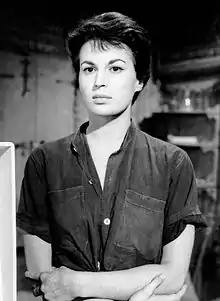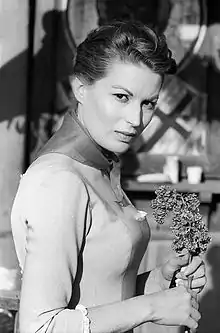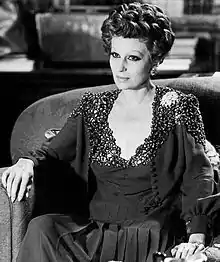Silvana Mangano
Silvana Mangano (Italian pronunciation: [silˈvaːna ˈmaŋɡano]; Rome 21 April 1930[1] – Madrid 16 December 1989)[2] was an Italian actress.
Silvana Mangano | |
|---|---|
 Silvana Mangano in 1956 | |
| Born | 21 April 1930 |
| Died | 16 December 1989 (aged 59) Madrid, Spain |
| Resting place | Pawling, New York, U.S. |
| Occupation | Actress |
| Years active | 1945–1987 |
| Spouse(s) | |
| Children | 4, including Veronica and Raffaella |
Raised in poverty during World War II, Mangano trained as a dancer and worked as a model before winning a Miss Rome beauty pageant in 1946.[2] This led to work in films; she achieved success in Bitter Rice (1949) and continued working in films for almost four more decades.
Early life
Born in Rome to an Italian father and an English mother (Ivy Webb from Croydon), Mangano lived in poverty during World War II. Trained for seven years as a dancer, she supported herself as a model.
In 1946, at age 16, Mangano won the Miss Rome beauty pageant, and through this, she obtained a role in a Mario Costa film. One year later, she became a contestant in the Miss Italia contest. The contest that year became a springboard for a pool of potential actresses, including the winner Lucia Bosé, Mangano and several other future stars of Italian cinema such as Gina Lollobrigida, Eleonora Rossi Drago and Gianna Maria Canale.
Film career


Mangano's earliest connection with filmmaking occurred through her romantic relationship with actor Marcello Mastroianni. This led her to a film contract, though it took some time for Mangano to ascend to international stardom with her performance in Bitter Rice (Riso Amaro, Giuseppe De Santis, 1949). She signed a contract with Lux Film in 1949, and later married producer Dino De Laurentiis.[1]
Although she never had an international career to match her contemporaries Sophia Loren and Gina Lollobrigida, Mangano remained a favorite star between the 1950s and 1970s, appearing in Anna (Alberto Lattuada, 1951), The Gold of Naples (L'oro di Napoli, Vittorio De Sica, 1954), Mambo (Robert Rossen, 1955), Theorem (Teorema, Pier Paolo Pasolini, 1968), Death in Venice (Morte a Venezia, Luchino Visconti, 1971), and The Scientific Cardplayer (1972).
Personal life
It is claimed that she had affairs with Mohammad Reza Shah of Iran during the late 1940s.[3] Married to film producer Dino De Laurentiis from 1949, the couple had four children: Veronica, Raffaella, Francesca, and Federico.[2] Veronica's daughter Giada De Laurentiis is the host of Everyday Italian and Giada at Home on the Food Network. Raffaella co-produced with her father on Mangano's penultimate film, Dune (David Lynch, 1984). Federico died in an airplane crash in 1981 in Alaska.[2] De Laurentiis and Mangano separated in 1983, and Mangano began divorce proceedings in 1988.[4]
Following surgery on 4 December 1989 that left her in a coma, Mangano died of lung cancer in Madrid, Spain on 16 December 1989.[1]
Partial filmography
- Le jugement dernier (1945)
- Elixir of Love (1947) as Adina's girlfriend (uncredited)
- Flesh Will Surrender (1947) as Ballerina alla festa di capodanno (uncredited)
- Gli uomini sono nemici (1948)
- Mad About Opera (1948) as Una ragazza nella rappresentazione di Carmen (uncredited)
- Black Magic (1949) (uncredited)
- Bitter Rice (1949) as Silvana
- The Wolf of the Sila (1949) as Rosaria Campolo
- Il Brigante Musolino (1950) as Mara
- Anna (1951) as Anna
- Il più comico spettacolo del mondo (1953) (uncredited)
- Mambo (1954) as Giovanna Masetti
- Ulysses (1954) as Circe / Penelope
- The Gold of Naples (1954) as Teresa (segment "Teresa")
- The Wolves (1957) as Teresa
- This Angry Age (1957) as Suzanne Dufresne
- Tempest (1958) as Masha
- La Grande Guerra (1959) as Costantina
- Five Branded Women (1960) as Jovanka
- Crimen (1960) as Marina Capretti
- The Last Judgment (1961) as Signora Matteoni
- Barabbas (1961) as Rachel
- The Verona Trial (1963) as Edda Ciano
- My Wife (1964) as The wife (segments "L'uccellino", "L'automobile") / Clara (segment "I miei cari") / Eritrea (segment "Eritrea") / Luciana (segment "Luciana")
- Il disco volante (1964) as Vittoria Laconiglia
- Me, Me, Me... and the Others (1966) as Silvia
- Pardon, Are You For or Against? (1966) as Emanuela
- The Witches (1967) as Gloria (segment "Strega Bruciata viva, La") / Lady in a hurry (segment "Senso civico") / Assurdina Caì (segment "Terra vista dalla luna, La") / Nunzia (segment "Siciliana, La") / Giovanna (segment "Sera come le altre, Una")
- Edipo re (1967) as Jocasta
- Caprice Italian Style (1968) as Bambinaia (segment "Bambinaia, La") / Moglie dell'automobilista (segment "Perche'?") / La regina (segment "Viaggio di lavoro")
- Teorema (1968) as Lucia (the mother)
- Morte a Venezia (1971) as Tadzio's mother
- The Decameron (1971) as The Madonna (uncredited)
- Scipio the African (1971) as Emilia
- The Scientific Cardplayer (1972) as Antonia
- D'amore si muore (1972) as Elena
- Ludwig (1973) as Cosima Von Bülow
- Gruppo di famiglia in un interno (1974) as Marchesa Bianca Brumonti
- Dune (1984) as Rev. Mother Ramallo
- Oci ciornie (1987) as Elisa (Romano's Wife)
- Slugs (1988) as Diner in restaurant (uncredited) (final film role)
Although it was sung by Flo Sandon's, Silvana Mangano was credited on the record label of "El Negro Zumbón", which is from the soundtrack of the film Anna (1951) and was a hit song in 1953. A clip of the opening of this performance is featured in the film Cinema Paradiso (1988).
References
- "Mort de Silvana Mangano La magicienne". Le Monde. 18 December 1989. p. 10.
- Flint, Peter B. (17 December 1989). "Silvana Mangano Is Dead at 59; Starred as Peasant in "Bitter Rice"". New York Times.
- KINZER, STEPHEN (2003). All the Shah's men : an American coup and the roots of Middle East terror. John Wiley & Sons, Inc. p. 62. ISBN 0-471-26517-9.
- Obituary: Dino De Laurentiis, Daily Telegraph, 11 November 2010
External links
| Wikimedia Commons has media related to Silvana Mangano. |